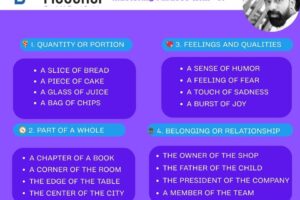
Common English Mistakes You Must Avoid (And How to Fix Them)
English is a widely spoken language, but even fluent speakers can make common mistakes that affect clarity and communication. Whether you are a student, a professional, or someone learning English as a second language, avoiding these errors will improve your fluency and confidence. Here are some of the most frequent English mistakes and how to fix them.
1. Confusing “Your” and “You’re”
- Mistake: “Your going to love this movie.”
- Correction: “You’re going to love this movie.”
- Tip: “Your” is possessive (e.g., “Your book is on the table”), while “you’re” is a contraction for “you are.”
2. Misusing “Their,” “There,” and “They’re”
- Mistake: “There going to the park with there dog.”
- Correction: “They’re going to the park with their dog.”
- Tip: “Their” is possessive, “there” refers to a place, and “they’re” is a contraction of “they are.”
3. Mixing Up “Its” and “It’s”
- Mistake: “The dog wagged it’s tail.”
- Correction: “The dog wagged its tail.”
- Tip: “It’s” means “it is” or “it has,” while “its” is possessive.
4. Incorrect Use of “Then” and “Than”
- Mistake: “I like pizza better then pasta.”
- Correction: “I like pizza better than pasta.”
- Tip: “Then” is used for time sequences, and “than” is used for comparisons.
5. Subject-Verb Agreement Errors
- Mistake: “She go to the gym every morning.”
- Correction: “She goes to the gym every morning.”
- Tip: The verb must agree with the subject in number and person.
6. Using “Me” Instead of “I”
- Mistake: “Me and John went to the store.”
- Correction: “John and I went to the store.”
- Tip: When in doubt, remove the other person and check if the sentence still makes sense.
7. Double Negatives
- Mistake: “I don’t have no money.”
- Correction: “I don’t have any money.”
- Tip: Using two negatives cancels out the meaning.
8. Misplacing Apostrophes
- Mistake: “The Smith’s are coming over for dinner.”
- Correction: “The Smiths are coming over for dinner.”
- Tip: Apostrophes are used for contractions and possession, not plurals.
9. Confusing “Effect” and “Affect”
- Mistake: “The new law will effect many people.”
- Correction: “The new law will affect many people.”
- Tip: “Affect” is a verb, and “effect” is usually a noun.
10. Incorrect Word Order in Questions
- Mistake: “Where I can find the nearest bank?”
- Correction: “Where can I find the nearest bank?”
- Tip: In questions, the auxiliary verb comes before the subject.
Final Thoughts
Avoiding these common mistakes will greatly enhance your communication skills. Regular practice, reading, and proofreading your work can help you become more proficient in English. Keep learning and improving!



